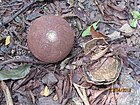Note: This is a project under development. The articles on this wiki are just being initiated and broadly incomplete. You can Help creating new pages.
Difference between revisions of "Couroupita guianensis - Nagakesara"
(→Parts Used) |
(→Commonly seen growing in areas) |
||
| Line 57: | Line 57: | ||
==Commonly seen growing in areas== | ==Commonly seen growing in areas== | ||
| − | {{Commonly seen| | + | {{Commonly seen|Tropical}}, {{Commonly seen|Terrestrial}}, {{Commonly seen|Tropical South America}}. |
==Photo Gallery== | ==Photo Gallery== | ||
Revision as of 15:39, 15 May 2018
Nagalingam is a deciduous tree in the family Lecythidaceae, which also contains the Brazil nut and Paradise nut Lecythis zabucajo. It is native to the rainforests of Central and South America.
Contents
- 1 Uses
- 2 Parts Used
- 3 Chemical Composition
- 4 Common names
- 5 Properties
- 6 Habit
- 7 Identification
- 8 List of Ayurvedic medicine in which the herb is used
- 9 Where to get the saplings
- 10 Mode of Propagation
- 11 How to plant/cultivate
- 12 Commonly seen growing in areas
- 13 Photo Gallery
- 14 References
- 15 External Links
Uses
stomach aches, colds, skin diseases, malaria, wounds, toothache, hypertension, tumors, inflammation
Parts Used
Chemical Composition
Presence of alkaloids, flavonoids, glycosides, phlobatannins, steroids, tannins and terpenoids[1]
Common names
| Language | Common name |
|---|---|
| Kannada | Lingada mara, Nagalingam |
| Hindi | Nagalinga, Tope gola |
| Malayalam | Nagalingam |
| Tamil | Naagalingam |
| Telugu | Nagalingam |
| Marathi | NA |
| Gujarathi | NA |
| Punjabi | NA |
| Kashmiri | NA |
| Sanskrit | |
| English | cannonball tree |
Properties
Reference: Dravya - Substance, Rasa - Taste, Guna - Qualities, Veerya - Potency, Vipaka - Post-digesion effect, Karma - Pharmacological activity, Prabhava - Therepeutics.
Dravya
Rasa
Guna
Veerya
Vipaka
Karma
Prabhava
Habit
Identification
Leaf
| Kind | Shape | Feature |
|---|---|---|
| Simple | alternate | leaves are up to 20 centimeters long, entire to slightly serrate and hairy on the veins beneath |
Flower
| Type | Size | Color and composition | Stamen | More information |
|---|---|---|---|---|
| Unisexual | 2-8 long | Reddish | 5 | flowers are fragrant, with stamens borne on an overarching androphore |
Fruit
| Type | Size | Mass | Appearance | Seeds | More information |
|---|---|---|---|---|---|
| large | 15 to 24 centimeters | reddish-brown globose | 200 to 300 | {{{6}}} |
Other features
List of Ayurvedic medicine in which the herb is used
- Vishatinduka Taila as root juice extract
Where to get the saplings
Mode of Propagation
How to plant/cultivate
Plants are very susceptible to frost[3]
Commonly seen growing in areas
Tropical, Terrestrial, Tropical South America.
Photo Gallery
References
External Links
- Ayurvedic Herbs known to be helpful to treat stomach aches
- Ayurvedic Herbs known to be helpful to treat colds
- Ayurvedic Herbs known to be helpful to treat skin diseases
- Ayurvedic Herbs known to be helpful to treat malaria
- Ayurvedic Herbs known to be helpful to treat wounds
- Ayurvedic Herbs known to be helpful to treat toothache
- Ayurvedic Herbs known to be helpful to treat hypertension
- Ayurvedic Herbs known to be helpful to treat tumors
- Ayurvedic Herbs known to be helpful to treat inflammation
- Herbs with Fruits used in medicine
- Herbs with common name in Kannada
- Herbs with common name in Hindi
- Herbs with common name in Malayalam
- Herbs with common name in Tamil
- Herbs with common name in Telugu
- Herbs with common name in English
- Habit - Deciduous Tree
- Index of Plants which can be propagated by Seeds
- Index of Plants which can be propagated by Cuttings
- Herbs that are commonly seen in the region of Tropical
- Herbs that are commonly seen in the region of Terrestrial
- Herbs that are commonly seen in the region of Tropical South America
- Herbs










